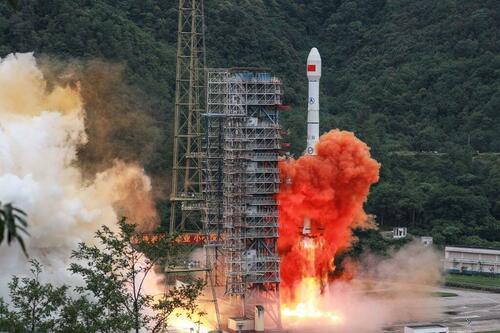Authored by Gordon Chang via The Gatestone Institute,
"With our commercial assets, we have observed five different objects in space maneuvering in and out and around each other in synchronicity and in control," the U.S. Space Force's Vice Chief of Space Operations Gen. Michael Guetlein told the 16th annual McAleese Defense Programs conference in Arlington, Virginia on March 18.
"That's what we call dogfighting in space. They are practicing tactics, techniques and procedures to do on-orbit space operations from one satellite to another."
Guetlein's stark comment about China signals a break with the past. "This marks the end of the Western-American-liberal dream of nations leaving wars on Earth so they can cooperate in space to advance humanity," Richard Fisher of the International Assessment and Strategy Center told Gatestone after the general's widely publicized remarks. "Communist China has now taken war to the heavens, to low earth orbit, and very likely, will take war to the moon, Mars, and beyond. The heavens are no longer safe for the democracies."
Space is now a highly contested domain, but it wasn't always this way. "We told ourselves we would be the dominant power forever," Brandon Weichert, author of Winning Space: How America Remains a Superpower, said to Gatestone. "We coasted on that notion for far too long. Rising powers, notably China and Russia, saw how reliant we were on space—and how poorly defended our systems were. Our access to the strategic high ground is now more threatened than ever before."
As Weichert points out, "bureaucratic inertia and a lack of visionary leadership from both political parties" allowed China and Russia to develop the capabilities to threaten America in space.
There was another party at fault: The U.S. military failed to protest when it could see there was an obvious threat. "There was a gentlemen's agreement until recent that we didn't mess with each other's space systems," Guetlein said. "We didn't jam them, we didn't spoof them, we didn't lase them, we just kept them safe."
Why was the U.S. so gentlemanly? Presidents believed that because the U.S. had more space assets than others, it was not in America's interest to trigger a race to build weapons to destroy those assets. Yet this view, appearing commonsense at first glance, was naïve: It was apparent even then that neither China nor Russia could be enticed into good behavior. Generals and admirals should have sounded the warning.
There was a lot to warn about. On January 11, 2007, for instance, China demonstrated its intentions by launching a modified ground-based DF-21 missile to destroy an old Chinese weather satellite.
In 2022, a Chinese satellite "grappled" a defunct Chinese satellite and towed it to a "graveyard orbit."
Moreover, as Fisher notes, China had already configured its one large orbiting platform, the Tiangong Space Station, for military missions as well as civilian ones. One of its modules can launch either very small satellites that can perform interception missions or satellites carrying powerful laser and microwave weapons that can destroy satellites in multiple orbits.
What was the American response to the obvious Chinese advances in space-warfare capabilities? Vice President Kamala Harris in April 2022 announced a unilateral moratorium on ground-launched anti-satellite missile tests, in the hopes that other nations would follow suit.
With this posture, it is no wonder why America's lead in space warfare—if it exists—is narrowing.
Now, China is making fast progress in building space weapons. "The Chinese ISR"—intelligence, surveillance, and reconnaissance—"capabilities are become very capable," said Guetlein. "They have gone from what we used to call a 'Kill Chain' to a 'Kill Mesh.'" A Kill Mesh combines ISR satellites with an array of weapons systems.
The Chinese array appears impressive. As Fisher points out, the People's Liberation Army has developed ground-based ASAT—anti-satellite—interceptors to destroy satellites in both low earth orbit and much higher medium earth orbits. At the same time, China, as Guetlein's comments make clear, is working on "co-orbital" interceptors, satellites that can follow, approach, dock with, or use robotic arms to grapple other satellites into useless orbits.
For the future, Fisher reports, China is developing large, unmanned space planes that can re-enter the atmosphere to maneuver toward a new orbit and then relaunch into space to deploy energy and missile weapons. The PLA also appears to be working on large combat platforms that can attack satellite targets in multiple orbits. Expect the Chinese military also to deploy clusters of combat satellites to attack the Lunar and Martian satellite networks of the future.
"The recent demonstration of Chinese 'dogfighting' capabilities in space is an indicator that Beijing means to use force on earth," says Weichert. "By targeting sensitive U.S. military satellites, the People's Liberation Army can render us deaf, dumb, and blind, long before it strikes."
The Chinese are evidently planning to blind not only America's military but also America's civilian society, which is heavily dependent on space assets. Almost nothing modern in America will work when the Chinese are finished attacking in the heavens.
As Weichert said, "A space Pearl Harbor is at hand."
Loading...
